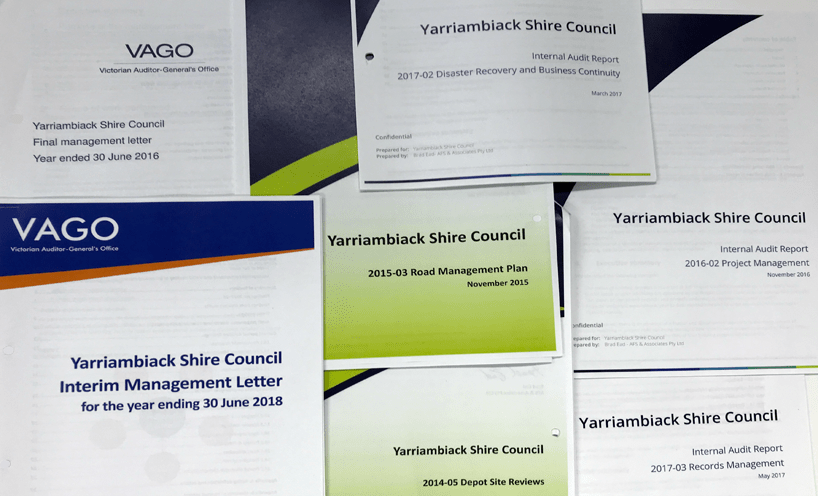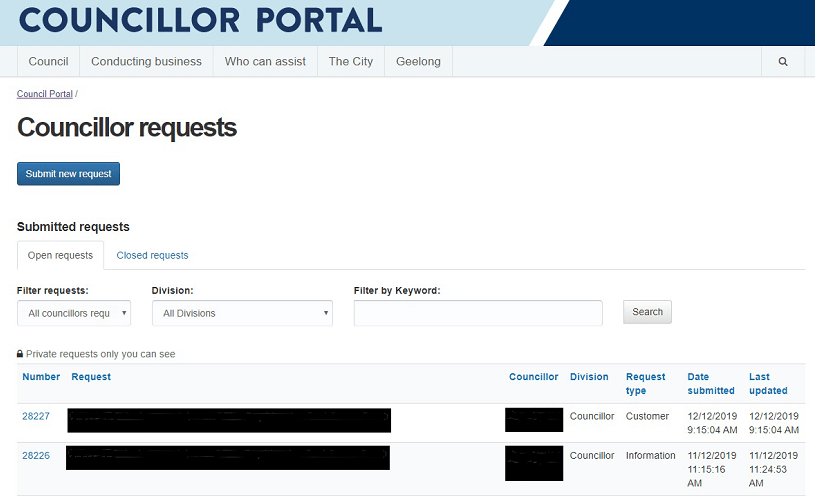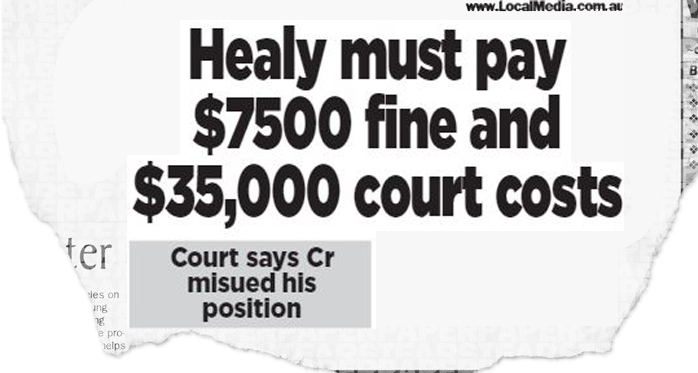- Date:
- 16 Dec 2019
David Wolf, Chief Municipal Inspector
Welcome to our summer 2019 edition of integrity matters as we lead into the festive season and the holiday break. In this edition we highlight the recent Yarriambiack Shire Council investigation report which represents a significant body of work from my team.
Importantly, the report identifies many issues that are not exclusive to Yarriambiack Shire and provides a good reference guide for councils and public sector organisations that have regional and largely autonomous operations.
Another key article relates to information transmission between the elected council and the council organisation. In many cases the LGI handles, the requests for information and provision and detail of that information becomes a matter of contention and, at times, conflict between councillors and the administration.
In our work we have observed a process that provides transparency and equity around the information process and has assisted councillors and the administration in their role. I thank both Geelong and Surf Coast Councils for sharing their processes.
Finally, I take this opportunity to wish the local government sector all the very best over the holiday period and, in particular, I would like to acknowledge those that work in critical services or functions over this period to ensure your communities are safe.
Investigation into Yarriambiack Shire Council
The Inspectorate recently published a report detailing findings following an investigation into Yarriambiack Shire Council. The investigation related to specific allegations around council asset and resource use and broader governance arrangements for council operations.
The Inspectorate found:
- a council that had not kept pace with the requirements and expectations of councils as a contemporary organisation and management at the time were complacent
- policies and rigour around community assets and resources were insufficient and the management were complacent
- many of the issues found in this investigation had the potential for a negative impact on ratepayers and residents of the shire
There were significant improvements noted in recent months but there were many facets of this investigation that provide learnings for other councils.
Chief Municipal Inspector David Wolf said: “Our work focused on specific allegations where community assets and resources had either not been properly managed or were used to the benefit of individuals, not the community as a whole."
“Our investigation has presented challenges for Yarriambiack Shire Council but we have been encouraged by the willingness to improve and the assistance from administrative and operational staff. This report is a great guide for all council depots and public sector organisations, especially those with remote or autonomous operations."
Election period policy compliance work
Under the Local Government Act 1989, Victorian councils are required to review and if required amend an election period policy no later than 12 months before the commencement of each general election period. This must be conducted in accordance with section 93B of the Local Government Act 1989.
The Inspectorate recently sent a short survey to all councils on the adoption of their election period policy.
At the time of publication, 66 councils had reviewed and amended their election period policy (often also known as a caretaker period policy). While 32 councils had adopted a policy outside of the required timeframe, this does not invalidate the policy but is still a breach of statutory requirements.
Eleven councils had not adopted a policy but proposed to do so at an upcoming council meeting.
Common reasons given by councils for not adopting a policy in the required timeframe included:
- councils were not aware of the requirement
- legislation was not clear
- impending introduction of the Local Government Bill
- insufficient staff to carry out requirements
It was also found that 11 councils had not provided the policy to the community, through posting on their public website or other means, despite this also being a requirement under the Act.
Operations Manager Ross Millard said while 40 percent of councils had not complied with the Act, there was some useful feedback gained from the survey, such as councils’ lack of awareness of the timeframes or identifying a lack of resourcing or knowledge on compliance.
“This proactive work is intended to assist councils in complying with legislative requirements. We are analysing the information provided to determine any reforms to processes or the legislative framework,” Mr Millard said.
The Inspectorate will collate and provide any relevant information to the Minister for Local Government.
Elected councillors' access to council information
It is important that councillors that access to information but it is equally important there is an awareness of the impact this can have on the volume of work involved for council staff.
Over the past year, the Inspectorate has observed several examples of:
- councillors submitting numerous requests for information that has unclear benefit to the full council group
- staff or the CEO refusing requests for information that should be made available
- councillors pressuring staff to provide sensitive or commercial-in-confidence material they are not entitled to
- complaints being made about related activities to the Inspectorate
While complaints about unfair process are sometimes warranted, the Inspectorate encourages the use of tools that promote transparent sharing of information in its dealings with councils.
Geelong City Council instituted a councillor portal (pictured below) before the return of councillors in November 2017 as the key communication tool between councillors and the organisation.
Rebecca Leonard, Director Governance, Strategy and Performance, said the councillor portal allows councillors to submit requests on behalf of the community, while protecting them from influencing the outcome and protecting staff from being influenced.
“All councillor requests are visible for all councillors and they have the ability to track the status of their request, add comments and have a key contact,” she said.
“The councillor is kept informed but is not part of the decision making process for operational matters.”
Since the return of council in 2018, there have been more than 2500 requests submitted by councillors at an average of more than 100 requests per month.
In 2018, Surf Coast established clear protocols about councillor and staff interactions on requests for information and following from Geelong’s example, recently moved communications from being email-based to an online portal with a range of features:
- Web-based submission by councillors to which they can also attach photos, emails, documents
- Requests are visible to all councillors, unless the CEO determines that they are private or confidential matters
- Councillors can filter the request by who submitted it, and if the request is open or closed, so it is easy to find previous correspondence
- Councillors can also source meeting agendas and minutes, forms, policies, communications and other updates on the portal
Surf Coast Governance and Infrastructure General Manager Anne Howard said: “Effective interactions between councillors and staff are essential to a well-functioning council. Surf Coast councillors knew that their neighbours at Geelong had a portal-based system and were keen to move to something similar.”
For more information on Geelong’s information portal, contact Rebecca Leonard at rleonard@geelongcity.vic.gov.au
Healy court case concluded
The County Court upheld four charges of misuse of position following an appeal by former Murrindindi Shire councillor Chris Healy in late October. This outcome reinforced the importance of the office of councillor and the laws in place to make sure information is not misused.
His Honour Judge Paul Higham heard the appeal in September in Melbourne’s County Court. Mr Healy was found guilty with four charges proven and one charge being dismissed.
In sentencing on Monday, 21 October 2019, Judge Higham ordered Mr Healy pay a $7,500 fine and contribute $35,000 towards the prosecution legal costs. His Honour, in an exercise of discretion, did not impose a conviction, noting Mr Healy’s past good character.
Judge Higham observed that in Victoria, local government depends on the voluntary contributions of councillors and the public must have confidence in councillors as a democratic system. Judge Higham made clear that the position of a councillor must not be used for gain.
Mr Healy had attempted to gain an advantage by making improper use of information acquired while a councillor, regarding Murrindindi Shire’s proposed rating strategy.
The court heard that Mr Healy was privy to information about the tenderers for a rating strategy review, which he used in submissions to council and at a meeting of a local trader and tourism association to argue against a differential commercial rate of 125%. At the time, Mr Healy owned three commercial properties in Eildon.
The Inspectorate began its investigation in March 2015 and charged Mr Healy in April 2017 with misuse of position under section 76D(1) of the Local Government Act 1989.
Recent presentations and upcoming events
David Wolf took part in a panel in late October for the VLGA One Year Out session (pictured above) discussing early 2020 election planning and governance procedures.
The Inspectorate led the local government stream at the Australian Public Sector Anti-Corruption Conference (APSACC) on 30-31 October, hosted by the Independent Broad-based Anti-corruption Commission (IBAC). David Wolf facilitated a panel of academics and local government experts discussing corruption risks and local government integrity.
Some key issues were identified as emerging or future challenges for integrity in local government:
- data usage and compromise of data as security risks for an organisation
- cyber security
- procurement, specifically contract management integrity
A wrap-up of the conference is available on the IBAC website.
There was great engagement from representatives at a Corruption Prevention and Integrity Insights forum in Geelong, where representatives from across the public sector gathered to hear excellent speakers from Barwon Health, Geelong Council, IBAC, Ombudsman Victoria and VAGO.
With the increasing complexity of council organisations as a service delivery business, there are increasing expectations of elected councillors to provide governance oversight. Importantly, this includes the management of their skilled employee (CEO) in ensuring the effective management of the council as a business.
After five regional investigations, material has been consolidated into a presentation and education package aimed at councillors and the organisation to deliver to councils.
If any councils are interested in a presentation from the Inspectorate, please contact Selma Hamzic at inspectorate@lgi.vic.gov.au or on 1800 469 359.




